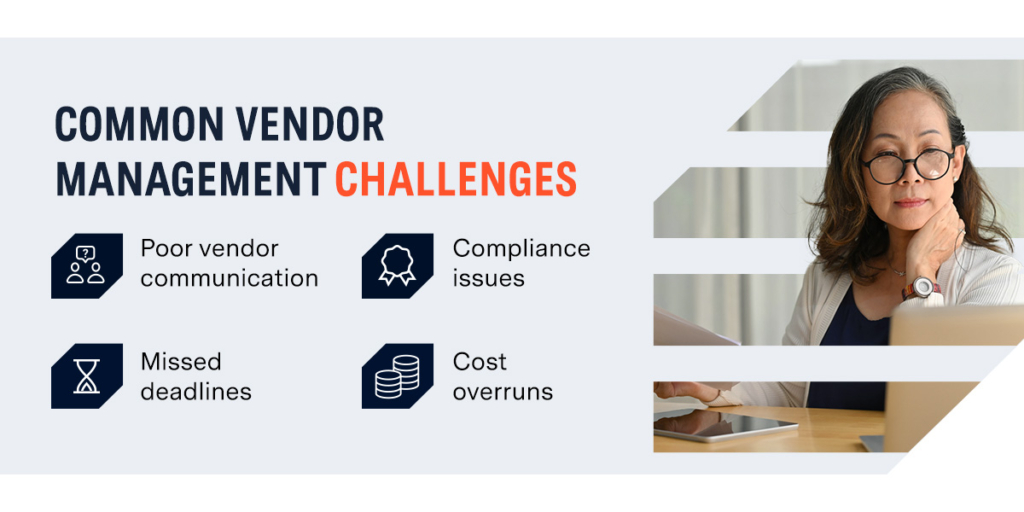
What is vendor management?
Those who don’t manage their vendor contracts effectively face risk, lost revenue, and too much time spent fixing mistakes.

Many businesses and organizations acquire goods and services from third-party vendors. Vendors are those whom organizations pay in exchange for deliverables that benefit those organizations.
The types of vendors vary widely based on an organization’s needs. They range from manufacturers and wholesalers to service and maintenance providers such as accountants, consultants, insurers, and those who maintain the physical properties of offices, like landscapers and cleaners.
However, good vendor management extends far beyond these direct transactions.
To make investing in what a vendor provides your organization worthwhile, you must make informed decisions from the planning stages to onboarding to managing relationships and tracking performance. This vendor management process and your vendor management system are crucial whether you are dealing with one or one hundred or more vendors.
Why is vendor management important?
Those who don’t manage their vendor contracts and relationships effectively face increased risk, potential lost revenue and profits, and too much time spent fixing mistakes that could’ve been avoided with a more streamlined process.
One crucial yet often overlooked aspect of vendor management is how vendor contracts are handled throughout their life cycles. Managing contracts well, from initiation to completion or renegotiation, leads to more lucrative vendor relationships. Strong processes and practices, in turn, lead to better-performing vendor contracts.
As a result, you’re more likely to meet vendor performance expectations and other business goals with good vendor management practices in place.
What is the process of vendor management?
Vendor lifecycle management begins long before an organization initiates contract negotiations and continues long after a contract is signed. Here are a few of the key steps involved in the process:
- Research: Businesses start by identifying potential vendors. They gather quotes and assess qualifications to find the best fit for their budget and needs. They’ll deliver a structured Request For Proposal (RFP) to keep everything transparent and easy to analyze.
- Contract negotiations: Once they select a vendor, contract negotiations begin. Negotiations define terms, prices, and key performance indicators. Well-drafted contracts let everyone know their roles and help prevent disputes.
- Vendor relationship management: Effective vendor management means constant collaboration and communication. Organizations need regular check-ins, performance reviews, and objective alignment to keep everyone on the same page.
- Evaluating vendor performance: Vendors will also get regular evaluations. They’ll be compared to agreed-upon metrics to keep them contract-compliant. Automated tracking tools provide detailed insights into vendor performance.
- Renegotiating or terminating contracts: When a contract term ends, organizations will renegotiate or terminate contracts. If performance issues are a concern, businesses might seek better terms or alternate options.
Good management practices allow an organization to determine which contracts perform well and which are underperforming or obsolete. It also allows for more compliant and profitable long-term relationships.
Common vendor management challenges

Vendor management isn’t as simple as telling vendors what you want. It’s a complex relationship that requires companies to monitor costs, compliance, and vendor efficiency. These challenges can disrupt operations, impacting profits if left unchecked:
- Poor vendor communication: Unclear contract terms, communication misses, sparse updates, and misaligned expectations lead to confusion. Organizations need clear communication channels and regular check-ins to ensure vendors stay on track and understand expectations.
- Missed deadlines: Late renewals or missed expiration dates can lead to financial penalties and service disruptions. Consider using CLM software with renewal alerts to prevent missed deadlines.
- Compliance issues: Vendors must follow industry regulations. Without proper oversight, businesses might face fines or reputational damage. Always conduct regular compliance audits and use management software to track and mitigate risks.
- Cost overruns: Uncontrolled vendor expenses can eat into profit margins. Monitor contract terms, set spending limits, and use analytics tools to track and control costs.
What is a vendor management system?
A vendor management system is software that helps businesses streamline vendor handling. A company’s vendor relationships, performance, and contracts are easily managed from one central platform. This solution tracks vendor agreements, automates approvals, checks compliance, and oversees other critical tasks.
These systems consolidate all vendor data and contracts, delivering valuable performance metrics data while supporting more efficient management. Businesses can use management systems to reduce their administrative burdens, reduce risks, and create stronger vendor relationships.
Vendor management benefits
There are many benefits organizations may enjoy from vendor management. You want to get the best deals on goods and services possible to maximize your revenue and profit goals, as well as get the best performance out of vendors. Vendor management helps achieve this. Here are a few additional benefits.
Avoid unnecessary risk
It should go without saying that each decision within an organization should be made in such a way that mitigates potential risks as much as possible. Proper vendor management can help avoid risks such as issues with compliance, cost, operation, and reputation. Verifying and tracking supplier information can help identify potential risks and ultimately lead to better-performing contracts.
Create long-term vendor relationships
Good vendor management starts with a proactive strategy to bring on the best vendors to meet the organization’s performance goals. Negotiating strong performing contracts with the right vendors means facilitating long-lasting and mutually beneficial relationships.
Good vendors are an important asset, as they are less likely to breach contracts or commit fraud, more likely to provide deliverables that meet performance expectations, and will build loyal relationships that don’t lead to unforeseen costs and risks to your reputation.
Build more efficient operations
Good vendor management can lead to a more efficient process of researching and onboarding new vendors, as well as negotiating better rates with both new and current vendors. Tracking your vendors’ performance can ensure the agreed-upon contractual obligations are met. It allows you to ensure performance expectations are met in terms of quality of deliverables, risk, cost, timeliness, accuracy, and other milestones and requirements.
Why use vendor contract lifecycle management software?
Contract Lifecycle Management (CLM) software can help streamline the way vendor contracts are managed, thereby increasing procurement efficiency, reducing risk, and building more cost-effective and better-performing vendor contracts.
CLM software systems can help optimize procurement in the following ways:
1. Streamline onboarding
Automated workflows allow for faster turnaround times and better spend control. CLM also provides a more streamlined contract negotiation process by providing standardized contract templates and clause libraries. A centralized repository ensures all parties can view and discuss changes across multiple drafts of a contract and securely sign electronically.
2. Improve negotiations
CLM helps maintain compliance with corporate standards. It also helps build contracts with consistent and appropriate language with a digital repository, clause library, and configurable business rules engine. Vendor negotiations are facilitated through a secure portal. The consistency CLM provides allows more accurate tracking and reporting, which can lead to identifying vendor needs such as quality, efficiency, timeliness, and cost savings.
3. Track vendor contract performance
Are vendors meeting their contractual obligations within their deadlines and providing the agreed-upon deliverables? Are contracts performing according to your organization’s vendor management KPIs?
CLM software allows for tracking of vendor performance against service level agreements and contract obligations, tracking spend against budget, and the functionality of precise access controls for vendors, partners, and internal staff. Businesses can also use CLM software to gain insights into risks and opportunities. They can generate custom reports or implement automatic alerts for compliance, spending, expirations, and other critical data.
4. Automate contract renewals
Missing contract renewal deadlines can lead to unfavorable renegotiations and even service disruptions. CLM software provides automated renewal reminders and workflows to keep your tasks on-time. Automated reminders make it easier to avoid missing agreement expirations.
Additionally, built-in contract amendment tools streamline agreement modification. Collaborators can access documents from the centralized system, make changes, track edits, and confirm terms. Automatic version histories ensure your team is audit-ready and compliant at all times.
5. Reduce risk
More than 60% of organizations experienced a cyber security incident due to their third-party vendor. Security is a top priority. Non-compliant vendor contracts and poor data security expose businesses to financial and legal risks. CLM software maintains a complete audit trail, enforces approval workflows, and ensures secure information access.
With CML software’s transparency and access controls, companies can create better trust with their vendors. They can rely on you to protect their information and comply with relevant regulations and audits automatically.
Build better vendor relationships with CLM platforms
When an organization invests in an enterprise-level CLM platform like Agiloft, vendor contracts will be more efficient, compliant, and secure, will perform to optimized standards, and will be managed in a streamlined and centralized system that significantly reduces costs.
Transform your vendor management with data-first CLM software when you schedule your customized demo here.

Recent
Posts
Discover how our integration with Screens enhances AI contract review, negotiation, and confidence with AI on the inside™.
Your CLM needs to be able to flex and scale as much as your organization does as it grows. Learn how to future proof your CLM.
Learn how to use contract data and data-first CLM to promote your legal team to true, strategic business drivers, influencing future decisions and process change.





